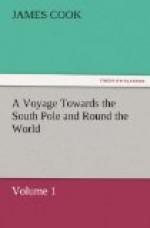We had no sooner anchored than we were visited by the natives, several of whom I remembered to have seen when I was here in the Endeavour, particularly an old man named Goubiah. In the afternoon, I gave orders for all the empty water casks to be landed, in order to be repaired, cleaned, and filled, tents to be set up for the sail-makers, coopers, and others, whose business made it necessary for them to be on shore. The next day we began to caulk the ship’s sides and decks, to overhaul her rigging, repair the sails, cut wood for fuel, and set up the smith’s forge to repair the iron-work; all of which were absolutely necessary. We also made some hauls with the seine, but caught no fish; which deficiency the natives in some measure, made up, by bringing us a good quantity, and exchanging them for pieces of Otaheitean cloth, &c.
On the 5th, the most part of our bread being in casks, I ordered some to be opened, when, to our mortification, we found a good deal of it damaged. To repair this loss in the best manner we could, all the casks were opened; the bread was picked, and the copper oven set up, to bake such parcels of it, as, by that means, could be recovered. Some time this morning, the natives stole, out of one of the tents, a bag of clothes belonging to one of the seamen. As soon as I was informed of it, I went to them in an adjoining cove, demanded the clothes again, and, after some time spent in friendly application, recovered them. Since we were among thieves, and had come off so well, I was not sorry for what had happened, as it taught our people to keep a better lookout for the future.
With these people I saw the youngest of the two sows Captain Furneaux had put on shore in Cannibal Cove, when we were last here: It was lame of one of its hind legs; otherwise in good case, and very tame. If we understood these people right, the boar and other sow were also taken away and separated, but not killed. We were likewise told, that the two goats I had put on shore up the Sound, had been killed by that old rascal Goubiah. Thus all our endeavours to stock this country with useful animals were likely to be frustrated, by the very people we meant to serve. Our gardens had fared somewhat better. Every thing in them, except the potatoes, they had left entirely to nature, who had acted her part so well, that we found most articles in a flourishing state: A proof that the winter must have been mild. The potatoes had most of them been dug up; some, however, still remained, and were growing, though I think it is probable they will never be got out of the ground.




